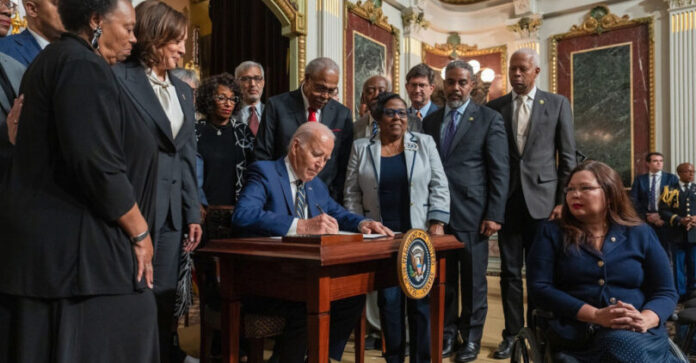
By Anthony Tilghman, Special to NNPA Newswire
If the Trump era has taught us anything – and it has indeed been a jarring ride in learning the hard way, one lesson that needs to be emphasized is that the illusory sense of normalcy surrounding the American two-party system has rapidly evaporated. For most Americans, the comfortable mirage of living under political stability and a functioning democracy was simply too fragile to withstand the constant barrage of blatant hypocrisy and bigotry coming from the far-right figureheads of the MAGA movement.
As in 2016, the mainstream media is still very much incapable of providing the actual ‘balance’ in coverage that is the lifeline of a healthy democratic culture. Since the inauguration of the Biden Presidency, many prestigious outlets have sought tooth-and-nail to highlight the alleged and real failings of not just the administration, but Joe Biden as a man, disproportionately drawing attention away from the objectively worse issues with both Trump’s ideology and personality. Senior analysts have aptly noted the close relationship between excessive negative coverage in mainstream media and the approval rating enjoyed by the 46th President of the United States.
Less than two weeks ago, the two leading candidates for the 2024 Presidential Elections gathered in an Atlanta studio operated by CNN for a structured debate around policy issues important to the voters. But in the wake of a few stumbles and a sore throat on Biden’s part, the respectable media seemingly had a profound ‘nervous breakdown’, as Chris Whipple, author of “The Fight of His Life: Inside Joe Biden’s White House,” put it. The editorial boards of publications from The New York Times to The Washington Post called for Mr. Biden to resign from the party ticket. On the other hand, Trump’s seeping hatred for the 10 million non-citizen residents of our country and repeated refusal to provide evidence for his false statements have largely been swept under the rug. Meanwhile, there is also growing evidence that the traditional means of public outreach and on-the-ground campaigning have simply become obsolete and irrelevant for all but a few in the electorate.
By contrast, one group that has been painfully aware of the oppressive abnormalities of Republican politics and does not shy away from pointing them out is the Black-owned media. With the unique historical experiences of the African-American communities in key battleground states, local Black-owned media outlets have much to offer that the legacy media simply cannot. Despite GOP claims to the contrary, a solid majority of Black men and women still appreciate the work done by the Biden Administration and the Democratic Party, not in small part thanks to this alternative access to information.
For instance, the latest polls from Michigan indicate that Biden is currently the first or second choice of nearly 99% of Black voters in the state. Local journalists and reporters in general have been shown to be much less concerned about appeasement to national party politics, and are henceforth more likely to be non-partisan. It comes as, therefore, no surprise that the Black media coverage of the Biden Administration and the election campaign has been much more moderate and balanced than the excessively negative portrayal painted by the establishment networks.
Unfortunately but predictably, the enormous contributions and impact of Black-owned media services has been conventionally neglected by both the government and party communication strategists. Out of the $14.9 billion spent by federal agencies for public advertisement from 2014 to 2023, only 14% went to businesses owned by ethnic minorities, women, and other disadvantaged groups. Black-owned media received no more than a miniscule $10 million of the total, amounting to less than 0.07%.
Even in the ongoing election cycle, the Biden campaign has aggressively targeted the Black communities in purple states for advertising, but so far relies almost exclusively on non-Black outlets to do the job. The National Newspaper Publishers Association (NNPA), which represents 250 African-American companies, has reached out to the campaign several times since January, but only received its first, $1.5 million contract in late-June. The first debate of the 2024 cycle notably took place in Atlanta, a stronghold of Black media enterprises. Yet, it is telling that out of the 600 media outlets that were invited for the coverage, not a single one was Black-owned.
This is rather unfortunate, for studies have repeatedly shown that Black consumers not only trust their local sources more than the U.S. average, but that Black-owned media also provides a unique focus and insights into the community, untarnished by racial stereotypes prevalent elsewhere. In other words, Black media is more likely to be persuasive and relevant to the local community than corporate newspapers can be.
The Biden campaign seems to at least appreciate the tragedy of the situation. The campaign appointed Jasmine Harris the Director of Black Media in January, and it is thanks to her efforts that the long overdue NNPA contract was eventually secured. Ever since the primaries, the campaign has also reached out to individual Black-owned outlets for briefings, a vital step in mobilizing the increasingly apathetic electorate. On Thursday, President Biden personally appeared on two Black radio shows for post-debate interviews. This is a step in the right direction, but with more equitable contracts and official campaign resources, the Black media can play a still more rigorous role in ensuring a victory for democracy in November.

